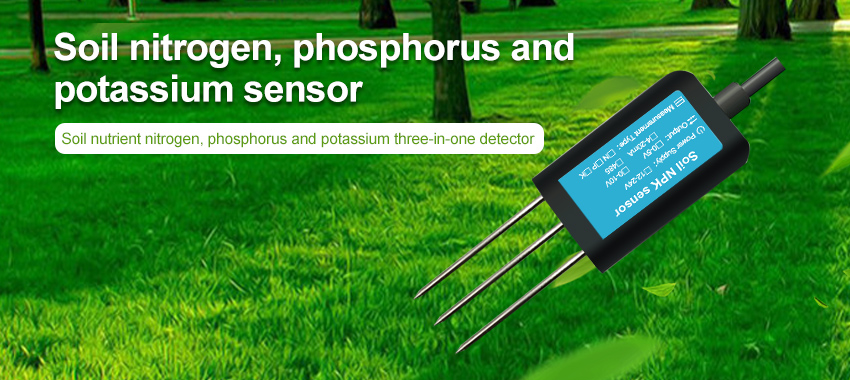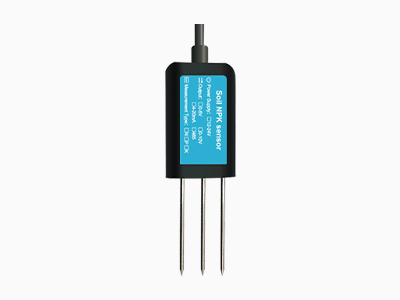Soil NPK sensor accurately and in real time assess soil nutrient levels, transforming the agricultural sector. Traditional methods of soil nutrient testing are time-consuming and often provide limited spatial information. This article explores the concept of soil NPK sensors, highlighting their key features, benefits, and their potential to revolutionize nutrient management practices.

Understanding Soil NPK Sensors
A soil NPK sensor is an advanced device that measures the levels of nitrogen (N), phosphorus (P), and potassium (K) in the soil. These three macronutrients are vital for plant growth and play a significant role in crop development. Soil NPK sensors utilize various technologies, including optical and electrochemical methods, to analyze the nutrient composition of the soil. By providing precise and instant data, these sensors help farmers make informed decisions regarding nutrient application and fertilization practices.
Key Features of Soil NPK Sensor

Modern soil NPK sensors offer several key features that make them invaluable tools for nutrient management in agriculture. Firstly, they provide real-time and on-site measurements of N, P, and K levels, eliminating the need for laboratory testing and reducing turnaround time. Secondly, these sensors can provide spatial data, offering insights into nutrient variations across different areas of the field. Additionally, some soil NPK sensors can be integrated with GPS technology, allowing for precise nutrient mapping and targeted fertilization practices.
Benefits of Soil NPK Sensors
The adoption of soil NPK sensors brings numerous benefits to both farmers and the environment. By accurately assessing the nutrient levels in the soil, these sensors enable precise nutrient management, reducing the risk of over-fertilization or under-fertilization. This optimized nutrient application leads to improved crop health, reduced fertilizer costs, and minimized environmental impact. Furthermore, soil NPK sensors help farmers monitor nutrient imbalances and adjust their fertilization strategies accordingly, promoting sustainable agriculture practices.
Applications of Soil NPK Sensor

Soil NPK sensors find application across various agricultural sectors, encompassing both small-scale farms and large commercial operations. In precision agriculture, these sensors enable site-specific nutrient management, allowing farmers to apply fertilizers precisely where and when needed. The data collected by soil NPK sensors can also be integrated with other variables such as yield maps and crop growth stages to develop targeted fertilization plans. Additionally, researchers and agronomists utilize soil NPK sensors to study nutrient dynamics, optimize fertilizer recommendations, and address soil nutrient deficiencies.
Integration with Digital Agriculture Technologies
The integration of soil NPK sensors with emerging digital agriculture technologies has the potential to revolutionize nutrient management practices further. By connecting these sensors to a centralized platform, farmers can access real-time data on nutrient levels and receive customized recommendations for fertilizer application. This integration allows for precise prescription-based fertilization, reducing costs and minimizing environmental impact. Furthermore, the integration with remote sensing technologies, such as drones or satellite imagery, enables large-scale nutrient monitoring and assessment.
The Future of Nutrient Management with Soil NPK Sensor
The future of nutrient management in agriculture lies in the widespread adoption of soil NPK sensors and advanced digital agriculture technologies. As technology continues to evolve, soil NPK sensors can be enhanced with features such as wireless connectivity, cloud-based data storage, and machine learning algorithms. These advancements will enable automated data analysis, predictive modeling, and optimized fertilizer recommendations. The integration of soil NPK sensors with precision irrigation systems and crop models will create a comprehensive approach to agricultural management, maximizing crop productivity while minimizing resource wastage.
Conclusion:
Soil NPK sensor become a game-changing tool in agriculture, providing real-time and accurate assessments of soil nutrient levels. By enabling precise nutrient management, these sensors enhance crop health, reduce fertilizer costs, and promote sustainable farming practices. With advancements in digital agriculture technologies, the future holds great potential for further enhancing the capabilities of soil NPK sensors and revolutionizing nutrient management practices. By embracing these innovations, farmers can optimize their fertilization strategies and contribute to a more efficient and sustainable agricultural system.
